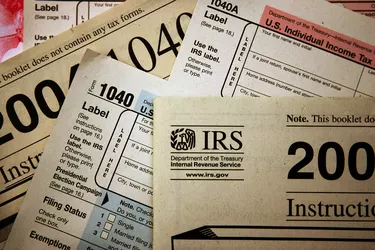
The Internal Revenue Service offers tax advantages for investing in a 403(b) to help eligible participants fund their retirement. However, there's a catch. You can't access the funds before you turn 59 1/2 in many cases, depending on your plan restrictions. If you have a qualifying reason to get some or all of the money early, the IRS takes a hefty bite out of the proceeds, meaning your check may be smaller than you expect.
Qualifying Events
Video of the Day
To withdraw funds from a 403(b), you'll need a triggering event. The two most common include turning 59 1/2 and separating from service -- meaning you leave your job and stop contributing to the plan. You also can take withdrawals if you are totally and permanently disabled, though you may have to justify that claim to the IRS. If your plan is terminated, you generally can withdraw the funds as well. If you're a military reservist or in the national guard and are called to active service for at least 179 days, or for an indefinite period, you may be allowed to access funds early without penalty. Finally, if you die with funds remaining in your 403(b), your heirs can take a distribution at that point.
Video of the Day
Demonstrating Hardship
Even if you don't have a qualifying event that meets the above standards, you may be able to retrieve some or all of the funds early, provided you can meet the IRS standards for a financial hardship. Among these reasons are:
- Deductible medical care expenses. These expenses, however, do not need to exceed the 7.5 percent of adjusted gross income that would be the threshold for deduction on the typical individual return.
- Costs directly related to the purchase of a principal residence.
- Payments necessary to prevent eviction from a primary residence, or to prevent a foreclosure on the mortgage for a primary residence.
- Expenses for the repair of damage to your primary residence that would qualify for a deduction under IRS section 165.
- Payment of tuition or other approved educational expenses for up to the next 12 months of post-secondary education. This can be used for your dependent's education as well.
- Burial costs or funeral expenses for your parent, spouse, child or other dependent.
Whether or not your 403(b) allows for hardship withdraws depends on the plan rules. A 403(b) is not required to provide for hardship distributions, though many do so. The hardship amount can't exceed the amount of your financial need, and you'll have to indicate that you couldn't have found the money from other readily-available sources. If you have $20,000 in a savings account, for example, the IRS likely will frown upon an attempt to remove $10,000 from a 403(b) earmarked for a down payment on a house. In addition, the funds have to be those that you elected to defer from your salary, rather than employer contributions.
Getting the Money
If you're withdrawing the funds from your 403(b) after you retire, your specific options depend on your plan. Generally, you can elect to have funds distributed to you on a regular basis, such as monthly or quarterly. You also can have the funds distributed as a lump-sum withdrawal. You don't have to take distributions until April 1 in the calendar year you turn 70 1/2 or April 1 of the calendar year following your retirement, whichever is later.
Any withdrawal prior to retirement age also is governed by your specific plan requirements. You generally will have to attest that you've had a distributable event under the plan. Some plans allow you to make the request online or by mailing or faxing in the required paperwork. Others require you to speak to a customer service representative for any withdrawal request before you turn 59 1/2. You'll usually have the option of requesting either a paper check or a direct deposit into your bank account.
Tax Burden
Because your contributions to your 403(b) came before taxes were taken out of your paycheck, the IRS will demand its cut when you withdraw the funds. Distributions are taxed as ordinary income, and most distributions withhold 20 percent of the amount requested for tax purposes. In addition, you may have to pay a 10 percent surrender fee if the withdrawal is made before you turn 59 1/2, if you haven't left your job after turning 55, or if it was not made as a result of your death or disability.